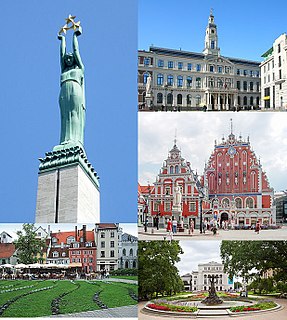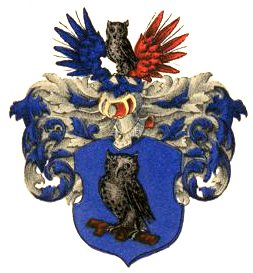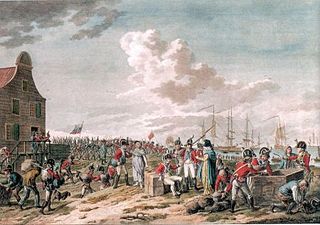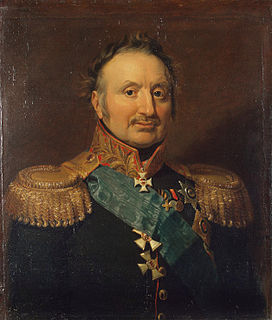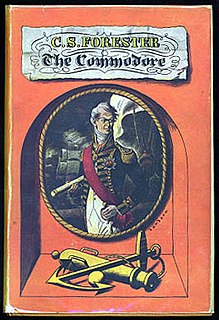
The Battle of Leipzig or Battle of the Nations was fought from 16 to 19 October 1813, at Leipzig, Saxony. The coalition armies of Russia, Prussia, Austria, and Sweden, led by Tsar Alexander I of Russia and Karl Philipp, Prince of Schwarzenberg, decisively defeated the French army of Napoleon I, Emperor of the French. Napoleon's army also contained Polish and Italian troops, as well as Germans from the Confederation of the Rhine. The battle was the culmination of the German campaign of 1813 and involved 600,000 soldiers, 2,200 artillery pieces, the expenditure of 200,000 rounds of artillery ammunition and 127,000 casualties, making it the largest battle in Europe prior to World War I.
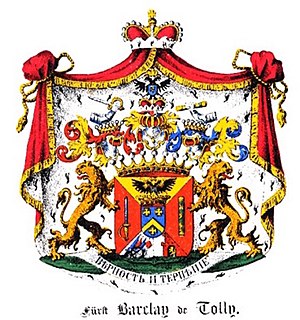
Prince Michael Andreas Barclay de Tolly was a Baltic German Field Marshal and Minister of War of the Russian Empire during Napoleon's invasion in 1812 and War of the Sixth Coalition. Barclay implemented a number of reforms during this time that improved supply system in the army, doubled the number of army troops, and implemented new combat training principles. He was also the Governor-General of Finland.

In the War of the Sixth Coalition, sometimes known in Germany as the War of Liberation, a coalition of Austria, Prussia, Russia, the United Kingdom, Portugal, Sweden, Spain and a number of German States defeated France and drove Napoleon into exile on Elba. After the disastrous French invasion of Russia of 1812, the continental powers joined Russia, the United Kingdom, Portugal and the rebels in Spain who were already at war with France.

Gerhard Johann David von Scharnhorst was a Hanoverian-born general in Prussian service from 1801. As the first Chief of the Prussian General Staff, he was noted for his military theories, his reforms of the Prussian army, and his leadership during the Napoleonic Wars. Scharnhorst limited the use of corporal punishments, established promotion for merit, abolished the enrollment of foreigners, began the organization of a reserve army, and organized and simplified the military administration.

Johann David Ludwig Graf Yorck von Wartenburg was a Prussian Generalfeldmarschall instrumental in the switching of the Kingdom of Prussia from a French alliance to a Russian alliance during the War of the Sixth Coalition. Ludwig van Beethoven's "Yorckscher Marsch" is named in his honor.

August Wilhelm Antonius Graf Neidhardt von Gneisenau was a Prussian field marshal. He was a prominent figure in the reform of the Prussian military and the War of Liberation.
Stackelberg is a surname, mainly known as the surname of a noble family of Baltic German descent. Notable people with the surname include:

Friedrich Wilhelm Rembert Graf von Berg was a Baltic German nobleman, statesman, diplomat and general who served in the Imperial Russian Army. Berg was a count of the Austrian Empire and Grand Duchy of Finland and the 5th last General-Field Marshal promoted in the history of the Russian Empire. He served as the Governor-General of Finland from 1854 to 1861 and the last Viceroy of the Kingdom of Poland from 1863 to 1874.

Graf Gustav Ernst von Stackelberg was a Russian diplomat of Baltic-German descent, and was the son of Otto Magnus von Stackelberg.

The Siege of Stralsund lasted from 30 January to 24 August 1807 and saw troops from the First French Empire twice attempt to capture the port city from Lieutenant General Hans Henric von Essen's
15,000-man Swedish garrison. On the first try, Marshal Édouard Adolphe Casimir Joseph Mortier blockaded the city for two months before he was called elsewhere. In his absence, the Swedes drove back the inferior blockading force. After Mortier returned and pushed Essen's troops back in turn, the two sides quickly concluded an armistice. The truce was later repudiated by King Gustav IV Adolf of Sweden, whereupon Marshal Guillaume Marie Anne Brune led 40,000 French, German, Spanish, Italian, and Dutch soldiers against the fortress. Fearfully outnumbered, the Swedes abandoned the Baltic Sea port of Stralsund to the Franco-Allies in this action during the War of the Fourth Coalition, part of the Napoleonic Wars. As a consequence, Sweden also lost the nearby island of Rügen.
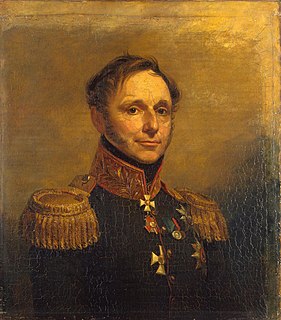
Count Peter Essen was a Baltic German General of the Infantry in 1819 and a count (1833). He belongs to the bourgeois Essen family from Pärnu. Essen's only daughter, Alexandrine Essen (1816–1868), married count Pontus von Stenbock-Fermor (1806–1866) in 1835, at which point they began using the joint name Essen-Stenbock-Fermor.
The Battle of Mesothen took place on September 29, 1812, between the Russian Corps of Finland and the French-allied Prussian Auxiliary Corps. It was fought near the Latvian town of Mežotne, then part of the Courland Governorate.
The Treaty of Paris of 5 March 1812 between Napoleon I of France and Frederick William III of Prussia established a Franco-Prussian alliance directed against Russia. On 24 June, Prussia joined the French invasion of Russia. The unpopular alliance broke down when the Prussian contingent in French service signed a separate armistice, the Convention of Tauroggen, with Russia on 30 December 1812. On 17 March 1813, Frederick William declared war on France and issued his famous proclamation "To My People".
Friedrich Wilhelm Graf von Lepel was a Prussian major general. His parents came from the von Lepel family, a noble family from Pommerania. He had four siblings - Dietrich (1767–1815), Catharina (1769–1833), Wilhelmine (1781–1795) and Adolph (1783–1847). He served as adjutant to Prince Henry of Prussia (1781-1846), younger brother of Frederick William III of Prussia.

Barclay de Tolly is the name of a Baltic German noble family of Scottish origin. During the time of the Revolution of 1688 in Britain, the family migrated to Russia from Towy (Towie) in Aberdeenshire. It then became a German-speaking family in Livonia.

The Battle of Ekau was a battle of the initial phase of the French invasion of Russia. Napoleon's troops from the 10th corps of Marshal MacDonald, who had the advantage, defeated the troops of Alexander I defending under the command of General Löwis.

Rennenkampff was a noble Baltic German family. It was of Westphalian origin and originated in Osnabrück. They held the title of Edler.

Toll was a Baltic German noble family of possible Hollandish origin. According to legend, the family's name originated from a castle near Leiden. The family held Swedish and Russian baronial and comital titles, Austrian baronial titles, Prussian, Oldenburgish, Finnish untitled noble status and also possibly belonged to Dutch nobility.


